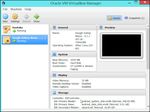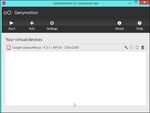An Open Source Android Applications Penetration Testing Lab
←
→
Page content transcription
If your browser does not render page correctly, please read the page content below
International Journal of New Technology and Research (IJNTR)
ISSN: 2454-4116, Volume-5, Issue-2, February 2019 Pages 06-09
An Open Source Android Applications Penetration
Testing Lab
Sawan Bhan, Nisha TN
to determine vulnerabilities. Among the mobile Oss ,Android
Abstract— Today, the majority of people have become is one of the most popular and the fastest growing mobile
completely dependent on mobileapplications. These operating system. However, during application development,
applications could be a gateway to sensitive data that attract sometimes developers make security mistakes or ignore the
more hackers. The Android penetration testing process helps to
address security weaknesses or vulnerabilities in the Android
secure coding practices. So, Android apps often contain
platform. In this paper, we present different penetration tests security weaknesses that need to be discovered before a
(or pentests) for Android-based mobile applications in a very successful hack. Application vulnerabilities, insecure
comprehensive manner. First, we explain how to set up a password storage, information disclosure, manifest
pentesting environment, including hardware/software privileges, insecure file permissions, and DDoS attacks are
requirements, USB debugging, and configuring a proxy.Next, all common vulnerabilities foundamongpentesting
weperform some of the most popular pen testing tools such as
AFLogical, Dex2jar, JD-GUI, Apktool and Drozer by using applications. The more protection the application needs, the
Santoku Linux distribution. Finally, we conduct an Android more often pentesting should be implemented to decrease the
repackaging attack on selected apps byusing Santoku Linux possibility of any attack.There is a large amount of resources
distribution and then demonstrate the attack on our Android of mobile application pentesting tools that are available on
VM. This work attempts to give developers and security the Internet. In this paper, we use Santoku Linux distribution
professionals a step-by-step guide for Android mobile [2] that is designed specifically for mobile forensics, mobile
application pen testing.
malware analysis, and mobile security testing. Basically, we
Index Terms— Vulnerability, Penetration, Testing, Assessment, cover the main steps that needed to conduct Android
Security. application pentesting such as setting up the environment,
configuring proxy, and performing some security tools
required for Android pentesting. Also, we conduct Android
I. INTRODUCTION mobile application repackaging at tackasasimulation of how
an attacker could repack an Android application.
A. Android PenetrationTesting
B. The Basics of Android
In the present day, people use their smartphones in almost
every aspect of their life, social interactions, Android is Linux-based open source software which is
career,finance,learning,and even health. According to divided into five main layers as shown in the architecture
Statista[1],“allofthe non-gaming app publishers in the Google diagram below, Figure 1. Basically, it is designed in the form
Play Store had double-digit download figures without any of a software stack architecture that contains four core layers:
signs of slowing down.” The rapidly increasing number of
mobileapplication users has attracted more hackers. This not
only increases the possibility and number of smartphones that
hackers could target, but it also increases the possibility to
hack any system or device that connects to the same network.
Smartphone penetration testing is one of the most essential
kinds of security pentesting that demonstrate what
exploitable vulnerabilities exist within application and the
level of damage that could occur if the application is hacked.
In general, penetration testing or (ethical hacking) is the
process of discovering security weaknesses and raising the
security level of systems, networks, or applications as
performed by a penetration tester or auditor.Also, it is
important to point out that penetration testing (often
shortened as pentesting) is commonly mistaken as
vulnerability testing. In fact, vulnerability testing is to Figure 1 Five core layers of Android [3]
identify potential problems, where penetration testing is
meant to analyze those problems as well as attack the system 1. Applicationlayer:
The application layer is the top layer of the stack. It
Sawan Bhan, Symbiosis Centre for Information Technology,Pune,India contains native applications and third- party applications
Nisha TN, Symbiosis Centre for Information Technology,Pune,India
6 www.ijntr.orgAn Open Source Android Applications Penetration Testing Lab
that are installed by a user such as (WhatsApp and target can be web application, mobile application, system,
Snapchat). server, ornetwork.
2. Application Framework layer:
The findings are documented in a standard document
The application Framework layer provides many upper structure.The documentisre-checked for the correctness of
level services to applications that manage and control the the details mentioned in the document. Document consists of 3
application layer. In this layer, the developers of the mainparts, the yare–Executive summary, Vulnerabilities
application are the only people who are allowed to control report, & Annexure – Areport This report is submitted to the
installed applications. The Android framework includes authority of the target.
four types of Android application components:
Activities: It controls all tasks through graphical user B. TOPMobileapplicationThreats:
interface performed by a user. a)
Content:It provides access to the installed applications to 1. Weak Server Side Controls
share information with other applications.
Services: Provides access to non-code embedded services
2. Lack of Binary Protections
which allow the user to execute multiple application
during one time such as listing to music while using the
internet.
3. Insecure Data Storage
Notifications orBroadcast:
It displays alerts and notifications.
4. Insufficient Transport Layer Protection
3. Libraries
This layer controls and accesses applications data.
Android provides a lot of C/C++ libraries for different 5. Unintended Data Leakage
uses. Here some of the most useful libraries:
System C Library: It allows developers to 6. Poor Authorization and Authentication
createapplications.
Media framework: It is useful to program
video and audio files. 7. Broken Cryptography
Android.content: It allows messaging between
applications and application components.
Android.webkit: It provides access to the 8. Client Side Injection
internet within anapplication
4. Android runtime 9. Security Decisions via Untrusted Inputs
This layer consists of Dalvik Virtual Machine (DVM) and
a set of core java programming libraries. Before running
any java applications, java files are converted into 10. Improper Session Handling
Dalvikformat (dex) to be optimized for a minimum
memory. IV. USEFUL TOOLS
5. LinuxKernel Below are some of the important tools used while
This layer is the most important layer because it controls performingSecurityAssessmentofandroidapplication:
core services such as hardware, memory management,
power controls, security, and rest of the software stack.
1. ADB: It is a CLI based interface that is used to interact
with the Android Device.
II. OBJECTIVE
2. DBBrowserforSQLite–Thistoolisusedtoviewthe
The objective of this thesis is to understand android security database file extracted throughADB.
architecture and analyze the android application security
using an applied Android mobile application 3. Apktool – This tool is used to reverse engineer the
penetration-testing framework. androidapplication.Thistooldecodestoitsalmostoriginal
form.
III. SYSTEM ANALYSIS
4. Dex2jar–This tool is used to convert the .dex file to .jar
A. Penetration Testingis the process of testing the security of file to View the source code of the application.
the application, network, and system etc. It is performed with
5. Drozer – This tool provides huge collection of public
the prior permission from the authority. Penetration testing is
exploitsfortestingthesecurityoftheapplication.
a systematic approach to find out the
vulnerability/Vulnerabilities present in the given target. The
7 www.ijntr.orgInternational Journal of New Technology and Research (IJNTR)
ISSN: 2454-4116, Volume-5, Issue-2, February 2019 Pages 06-09
6. MobSF– This tool is a powerful framework for
performing static analysis, dynamic analysis of android
application.
7. Logcat–This tool dumps the all the system logs.
V. PENETRATION TESTING PHASES
Gathering information – This is the first stage in
Penetration testing where the basic information and
functionalities of the application is gathered.
1. Analysis and Planning – This is the second stage in
penetration testing. In this stage the planning is made to
carry out the test. This involves deciding the flow of Figure 2(Genymotion setup page)
execution.
The virtual mobile device will boot up and appear on
2. VulnerabilityDiscovery–In this stage vulnerabilities are the screen like this:
discovered either using tool or manually.This stage finds
out thevulnerabilities present in the application.
3. Exploitation-In this stage the actual attack is done on the
application.In this stage the attack is performed to find out
level of severity of the vulnerabilities.
4. Risk Analysis and Recommendation–In this stage the
analysis of risk is performed to find out the impact.
5. Reporting – This is the post stage of testing the
application.In this stage a detailed report is prepared on the
findings and submitted to the person concerned.
VI. SETTING UP THE TESTINGENVIRONMENT
Download and installSantoku OS - Linux distro,Genymotion
- Android emulator and Virtual
Boxfromrespectiveofficialwebsites.
Virtual box and Genymotion installation and Setup process Figure 3 (Virtual android Device)
is straight forward. However, after installing Genymotion,
Now, we can proceed with the installation of Santoku OS in
we need to perform the following steps:
the virtual box, and provide around 30 GB space for the
Click on "Add". This will show us the list of android Santoku virtual hard drive. The final setting in the virtual box
virtual devices you can add. looks like as shown below:
Choose the one with which you like to work. I have
used"Google Galaxy Nexus - 4.1.1- API 16 -
720x1280".
Follow the next screens. This will download and
install the virtual device.
Now Start the Android virtual device from the genymotion as
shown.
Figure 4(Installation settings for Saktoku Linux installation
on virtual machine)
Then ,launch Santoku VM within VirtualBox.
8 www.ijntr.orgAn Open Source Android Applications Penetration Testing Lab
Since each vulnerability analysis area requires different tools VII. CONCLUSION
to examine the security configuration of the application, the Although developers care about security, not all of them have
tools of Santoku is categorized intofour areas: enough knowledge to diagnose or address security issues. It
may be impossible to create a fullysecure environment, but
1. Device Forensics tools,
there are some ways that help to identify threats and
2. Penetration testing tools, preventdata disclosure. Mobile penetration testing helps to
address security weaknesses or vulnerabilities that exist
3. Reverse engineering tools, within the mobile infrastructure.
Usage of android application is increasing exponentially.
4. Wireless analyzers tools Android apps are being developed and used to carry out
everyoperation.VAPTonandroidapplicationswillhelpto find
out the vulnerabilities present in the application. By
knowingthevulnerabilities, the developer can patch those
vulnerabilities.
REFERENCES
[1] Statista, “Annual number of mobile app downloads worldwide 2022 |
Statistic,”2018, Statista. [Online]. Available:
https://www.statista.com/statistics/271644/worldwide-free-and-paid-m
obileapp- store-downloads/. [Accessed:07-Jun-2018].
[2] Santoku-Linux. Retrieved from https://santoku-linux.com/.
[3] Android App Development Tutorial. (n.d.). Retrieved
fromhttp://android-app-
tutorial.blogspot.com/2012/08/architecture-system-application-
Figure 5 Santoku Linux distribution desktop stack.html#.WxenJPZFzRM
[4] Guarda, Teresa, et al. “Penetration Testing on Virtual Environments.”
Connecting Virtual Genimotion Device with Santoku Proceedingsof the 4th International Conference on Information and
Network Security - ICINS 16, 2016,doi:10.1145/3026724.3026728.
linux:
[5] Denis, Matthew, et al. “Penetration testing: Concepts, attack methods,
anddefense strategies.” 2016 IEEE Long Island Systems, Applications
Open the terminal in Santoku (under and Technology Conference (LISAT), 2016,
accessories-->lxTerminal). Connect the Santoku terminal doi:10.1109/lisat.2016.7494156.
with the adb device by using the following command: adb [6] KoopariRoopkumar and Bharath Kumar, "Ethical Hacking
connect ip address emulator UsingPenetration Testing" (2014). LSU
[7] Dawson, Joel, and J. Todd Mcdonald. “Improving Penetration
Example:adb connect 192.168.1.2 TestingMethodologies for Security-Based Risk Assessment.” 2016
Cybersecurity Symposium (CYBERSEC),
2016,doi:10.1109/cybersec.2016.016.
If the connection is successful, verify that the emulator is [8] Android Studio. Retrieved from
connected by typing the following command on the terminal: https://developer.android.com/studio/install
adb devices
Figure6 (adb connection)
So, we are ready to go and will be getting our hands dirty.
9 www.ijntr.orgYou can also read























































